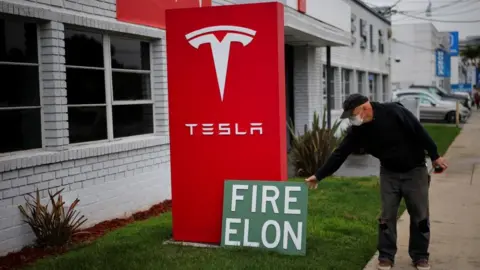**Tesla’s Revenue Decline Amid Controversial Leadership**
Tesla, the influential electric vehicle manufacturer, has reported a significant plunge in its profits and automotive revenues at the start of 2025. This downturn can be attributed chiefly to decreasing sales coupled with a growing backlash against the company’s CEO, Elon Musk, primarily due to his political affiliations and activities. The results have raised alarms among investors and analysts alike, as the company navigates unprecedented challenges.
During the first quarter of 2025, Tesla revealed a daunting 20% decrease in automotive revenue when compared to the same time frame in 2024. This alarming decline in revenue is set against the backdrop of Elon Musk’s political involvement, particularly his connection to former President Donald Trump, which many consumers have claimed has diverted attention from the company’s operations. As a result of these developments, Tesla’s profits took a severe hit, falling more than 70 percent.
The revelations about Tesla’s financial performance were accompanied by a cautionary message for investors; the company declined to provide a growth forecast and stated that “changing political sentiment” could significantly affect demand for its vehicles. Such insights indicate Tesla’s uncertainty in the current political climate which could impact not only its sales but also its long-term viability in the competitive automotive market.
The recent struggles of Tesla are further compounded by Musk’s substantial financial contributions to Trump’s reelection campaign, exceeding a quarter of a billion dollars. Musk’s active role in Trump’s Department of Government Efficiency (DOGE), focused on reducing federal spending, has led to increased dissent and protests against Tesla by consumers discontent with Musk’s political stance. These factors have contributed to a global boycott of the brand, negatively impacting its market presence.
For the first quarter of 2025, Tesla announced total revenue of $19.3 billion, which represents a decrease of 9% from the previous year. This figure fell significantly short of the anticipated $21.1 billion expected by analysts. In an attempt to counteract dwindling sales, Tesla has resorted to price cuts, but this approach has raised questions about the overall demand and profitability of its product offerings.
External economic factors, particularly Trump’s tariffs imposed on goods imported from China, have also created obstacles for Tesla. Although Tesla’s vehicles sold in the U.S. are assembled domestically, the company relies heavily on Chinese-made components. Consequently, shifting trade policies have introduced potential disruptions to its supply chain, further complicating Tesla’s operational efficacy and contributing to rising production costs.
Additionally, the company noted that rapidly evolving political dynamics could detrimentally affect demand for its products in the near future. While Tesla remains confident about future growth driven by advancements in artificial intelligence, skepticism surrounds this assertion, particularly given the challenges the company has recently encountered.
This climate of investor uncertainty is reflected in the company’s share value, which had plummeted by approximately 37% as of the market close on the day the financial results were announced. Indeed, shares remained relatively steady in after-hours trading, hinting at a cautious outlook among investors.
Dan Coatsworth, an investment analyst at AJ Bell, has voiced concerns regarding Tesla’s standing in a fiercely competitive market. He highlighted that the automotive manufacturer experienced a drastic 13% decrease in vehicle sales, recording the lowest sales figures in a span of three years. The disruption in global supply chains, exacerbated by the ongoing trade conflict instigated by Trump, presents further risks that could threaten Tesla’s future stability and growth.
In summary, Tesla finds itself in a precarious position marked by declining revenues, growing discontent surrounding its leadership, and external economic challenges. Unless the company can effectively navigate these multifaceted problems, its influence in the market may diminish further amid a rapidly changing landscape.



